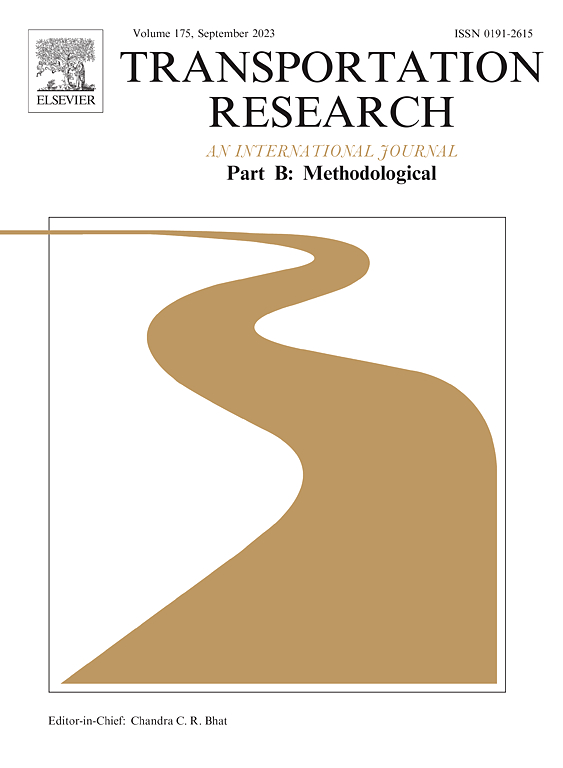Exploiting modularity for co-modal passenger-freight transportation
IF 6.3
1区 工程技术
Q1 ECONOMICS
引用次数: 0
Abstract
Using a game theoretic approach, this paper explores a futuristic passenger-freight co-modality system that leverages autonomous modular vehicle (AMV) technology. In our model, a transit operator and a freight carrier operate within a stylized city, transporting passengers and parcels, respectively. The freight carrier can rent the transit operator’s underutilized transport capacity during off-peak periods through a market mechanism. By analyzing the design problems of both the operator and the carrier, we characterize their willingness-to-trade function, which defines the feasible region for a two-player game. We formulate four distinct market mechanisms, each corresponding to a different type of game. The first two are leader–follower Stackelberg games, differing in which player assumes the leadership role. The third mechanism features iterative negotiation between both players until equilibrium is achieved, while the fourth assumes full cooperation. Our results indicate that in the Stackelberg games, the leader captures all the benefits of co-modality, whereas neither player benefits in the negotiation game. Moreover, the carrier-led Stackelberg game proves more efficient than the operator-led one. Finally, while regulatory interventions such as price caps can promote a more equitable benefit distribution in the Stackelberg framework, similar outcomes are attainable without intervention in the cooperative game.
开发客货联运的模块化
本文利用博弈论方法,探讨了一种利用自主模块化车辆(AMV)技术的未来客运-货运共模系统。在我们的模型中,运输运营商和货运运营商在一个程式化的城市中运营,分别运输乘客和包裹。货运公司可以通过市场机制,租赁运输公司在非高峰时段未充分利用的运力。通过分析运营商和运营商的设计问题,刻画了他们的交易意愿函数,该函数定义了二人博弈的可行区域。我们制定了四种不同的市场机制,每种机制对应一种不同类型的游戏。前两种是领导者-追随者Stackelberg游戏,不同之处在于玩家扮演领导角色。第三种机制的特点是双方反复协商,直到达到平衡,而第四个机制则要求双方充分合作。我们的研究结果表明,在Stackelberg博弈中,领导者获得了共模态的所有利益,而在谈判博弈中,双方都没有受益。此外,事实证明,运营商主导的Stackelberg博弈比运营商主导的博弈更有效。最后,虽然价格上限等监管干预可以在Stackelberg框架中促进更公平的利益分配,但在合作博弈中无需干预也可以实现类似的结果。
本文章由计算机程序翻译,如有差异,请以英文原文为准。
求助全文
约1分钟内获得全文
求助全文
来源期刊
CiteScore
12.40
自引率
8.80%
发文量
143
审稿时长
14.1 weeks
期刊介绍:
Transportation Research: Part B publishes papers on all methodological aspects of the subject, particularly those that require mathematical analysis. The general theme of the journal is the development and solution of problems that are adequately motivated to deal with important aspects of the design and/or analysis of transportation systems. Areas covered include: traffic flow; design and analysis of transportation networks; control and scheduling; optimization; queuing theory; logistics; supply chains; development and application of statistical, econometric and mathematical models to address transportation problems; cost models; pricing and/or investment; traveler or shipper behavior; cost-benefit methodologies.

 求助内容:
求助内容: 应助结果提醒方式:
应助结果提醒方式:


